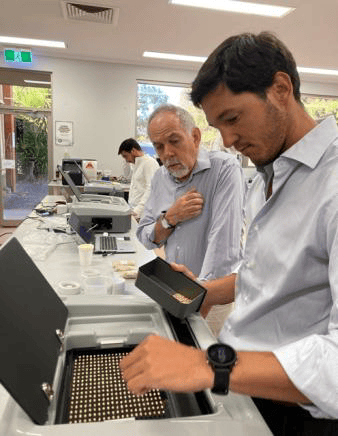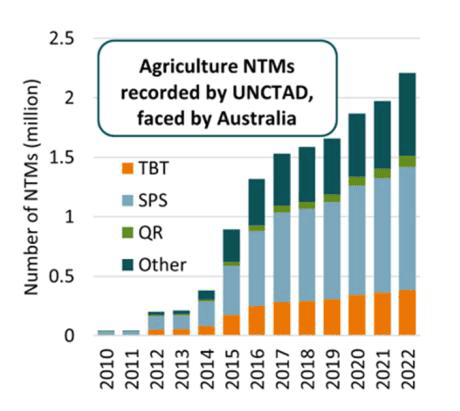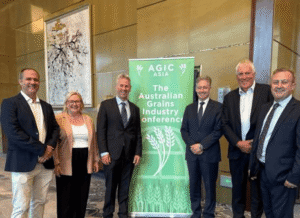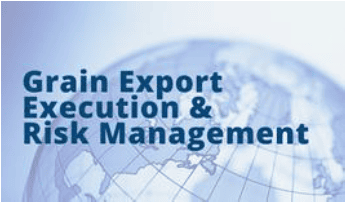

Exciting opportunities for the Australian grain industry continue to emerge in India. GTA is working with DAFF and DFAT to identify strategic, mutually beneficial grain partnerships that support trade and investment between our two countries.
With the India / Australia Comprehensive Economic Cooperation Agreement (CECA) progressing, there is strong potential to enhance grain trade flows and expand collaboration in AgTech solutions. India’s focus on food security, supply chain efficiencies, and sustainable agriculture presents clear areas where Australian expertise can contribute.
The inaugural AGIC India on 9 April, supported by Austrade and the local grain industry, provided a platform to strengthen these connections. The event brought together key stakeholders to discuss trade opportunities and market access, reinforcing Australia’s role as a trusted grain supplier to India.
While GTA continues to explore trade opportunities in India, we’re also engaging with the Australian Government on food security initiatives. The Albanese Government has launched Feeding Australia, a national strategy focused on securing Australia’s food future. With a strong emphasis on supply chain resilience, this aligns with GTA’s ongoing efforts to support a stable and efficient grain supply chain.
GTA has written to The Hon Julie Collins MP, Minister for Agriculture, Fisheries and Forestry, seeking to participate in consultative and advisory mechanisms, including membership on the National Food Council. As the leading body representing Australia’s grain industry, GTA and its members are well-placed to contribute insights that will strengthen national food security.
We look forward to further engagement and working collaboratively to support this important initiative.
Andrew Goyder, Chair – GTA

GTA recently attended and presented at the Australian Crop Breeders (ACB) Forum, the peak body representing organisations that develop new varieties for Australian field crop farmers.
At ACB’s request, we provided an update on our work to establish a protocol and assessment procedure for verifying grain variety assessment technology as a field reference method. In practice, this means GTA’s Trading Standards Committee will support and verify specific equipment for use at grain receival sites to identify delivered grain varieties.
ACB members were interested in this process, given their role in breeding barley varieties and the financial incentive for variety identification to allow the collection of Plant Breeders Rights.
We also updated delegates on a recent trial of varietal assessment technology, shared initial results, and outlined the next steps for industry engagement and communication.
GTA and the Department of Agriculture, Fisheries and Forestry (DAFF) are working together to uphold Australia’s reputation as a trusted supplier of safe, high-quality grain that meets both customer expectations and regulatory requirements.
As part of this effort, GTA is developing the Grain Storage Assets and Management Standard (GSAMS) — a new industry standard for businesses in the grain industry, designed to enhance customer confidence and competitiveness across the supply chain. GSAMS provides an auditable set of rules for managing grain storage, ensuring consistency in key areas such as sampling, handling, storage, and treatment for both domestic and export market requirements.
DAFF intends to support and integrate GSAMS within export-registered establishments by:
GSAMS and its supporting assurance framework provides:
Developed specifically for the grain supply chain, including DAFF export-registered establishments, GSAMS ensures that legal, regulatory, and operational requirements are consistently met, giving DAFF the confidence to introduce new regulatory assurance methods.
Industry adoption of GSAMS is voluntary for domestic and export businesses. GTA and DAFF will finalise arrangements in 2025, with communications and industry meetings planned to help businesses understand the opportunities GSAMS offers.
Tariffs and their impact on global trade have been in the spotlight following the Trump–US tariff program. Grain market analysts are watching closely, concerned about its effect on grain prices, international trade, and the movement of goods. However, trade barriers go beyond tariffs, with non-tariff measures (NTMs) already creating challenges for Australian exports.

A new ABARES Insights article highlights that NTMs impose a multi-billion-dollar burden on Australia. For Australian agriculture, this is comparable to a 19% tariff on exports. NTMs act as trade restrictions, often described as ‘red tape,’ and can be grouped into:
Sanitary and phytosanitary (SPS) measures – food safety and plant/animal health regulations
Technical barriers to trade (TBTs) – strict standards, testing requirements, and labeling rules
Quantitative restrictions – quotas and licensing requirements
The number of NTMs in agriculture has been increasing over time, making GTA’s work in this area more important than ever.
Through its Trade and Market Access Committee, GTA continues to work with DAFF and DFAT to minimise the impact of NTMs on Australian grain exports.
GTA and the National Working Party on Grain Protection (NWPGP) have submitted feedback on the Australian Pesticides and Veterinary Medicines Authority’s (APVMA) draft Strategic Plan 2025–2030.
GTA broadly supports the purpose and vision outlined in the plan, which aims to “protect the health and safety of people, animals and the environment, and to support Australia’s primary industries, biosecurity and international trade.”
Australia’s grain industry maintains a strong reputation for compliance with chemical residue requirements, which are set by both importing country governments and customers. As a trade-reliant industry, maintaining a robust regulatory system for AgVet chemicals is critical to ensure market access and support global competitiveness.
GTA recognises that without a strong and science-based regulatory framework, grain trade could be compromised. Consequently, GTA fully supports APVMA’s risk-based approach to chemical regulation, which underpins confidence in Australian grain exports.
For more details, we encourage members to read the full submission.
GTA issued Member Update 3 of 2025, notifying members of proposed amendments to the GTA Trade Rules and Contracts No. 3 and No. 6. These changes aim to provide greater clarity around the Domestic Market Zones.
A further Member Update will be released to confirm any approved changes. To learn more about GTA Trade Rules, enrol in one of our upcoming workshops.
GTA issued Market Notification 2 of 2025, advising members that on 5 March 2025, Pakistan rescinded approval for the fumigation of Australian canola with Methyl Bromide on arrival. As a result, there is currently no approved treatment option for canola exports into Pakistan.
Due to this change, DAFF is not issuing phytosanitary certificates for the export of canola to Pakistan at this time.

AGIC Asia 2025 saw strong support from local industry executives, government agencies, and Australian growers and exporters. This year saw an impressive 100 additional attendees compared to last year, attracting over 560 participants across two key locations: Bangkok (4 March) and Shanghai (6 March).
Post-event feedback highlighted strong engagement, with over 90% of participants rating the event as valuable for networking and market insights.
The conferences were formally opened by the Australian Ambassador to Thailand, Dr Angela Macdonald PSM, and the Australian Ambassador to China, H.E. Mr Scott Dewar, underscoring the importance of Australia’s trade relationships with key Asian markets.
Speakers focused on quality assurance, crop updates, and the Australian supply and demand outlook. In Bangkok, Dr Theerawit Poeikhampha from Kasetsart University provided insights into ASEAN feed sector opportunities driven by economic and demographic growth. In Shanghai, Professor Wen Jiping from Henan University of Technology and Chen Duan from COFCO shared key analyses on China’s wheat and grain markets, highlighting strong local production and slowing feed grain demand due to lower food consumption trends.
AGIC Asia also welcomed back ANZ’s Head of Research, Asia, Khoon Goh, who provided an in-depth analysis of global economic trends, including the potential impacts of U.S. trade policies.
With delegates from China, Thailand, Singapore, Australia, and Europe, the success of AGIC Asia 2025 reaffirmed the strength of Australia’s grain industry in international markets and provided a valuable platform for industry collaboration and knowledge-sharing. A full event report, including detailed insights, is available on the AGIC Asia website.

Following the success of AGIC Asia 2025, GTA continued its leadership in Beijing, hosting Roundtable sessions from 10 March. These sessions brought together Australian industry delegations, local government agencies, and trade representatives to strengthen trade relations, build mutual interests, and explore new collaboration opportunities. Australian Government staff supported discussions to facilitate trade and market access.
Grain demand in China has slowed due to economic factors, reduced consumption, and an aging population, alongside a larger local crop reducing import needs. Baiju production remains steady, though Australian sorghum faces challenges due to tannin content, with potential for crop adjustments to better align with Baiju production.
Beer demand is stable, with Australian malting barley deeply integrated into China’s brewing industry, maintaining a steady 2–3 million metric tons of demand. Feed demand is softer, driven by larger local crops and economic conditions, but Australian sorghum remains in strong demand for feed. Australia continues to be the preferred wheat supplier, valued for its high quality.

Australia exports grain to over 90 countries, each with its own quarantine requirements, making the process of exporting grain complex and risky. The Department of Agriculture, Fisheries and Forestry (DAFF) ensures these regulations are met with every consignment, and understanding them is crucial for Australian grain trading businesses. Ensuring compliance is critical, and the Grain Export Execution & Risk Management Workshop on 13–14 May in Melbourne, designed by GTA, provides essential insights to help Australian grain businesses navigate these challenges.
This workshop offers practical strategies for managing risks across grain contracts, logistics, dispute resolution, and government regulations. With export requirements constantly evolving, staying informed is key to protecting market access and ensuring smooth trade execution.
Industry experts from the legal, logistics, shipping, export documentation, and finance sectors will share valuable knowledge. The full program, list of topics, and speakers is available here. Virtual attendance is available for those unable to join in person.
Early Bird Pricing: $1,450 (inc. GST) – valid until 1 May.
Register now to gain the insights you need to navigate Australia’s grain export landscape with confidence.
Enhance your expertise in the Australian grain trade with GTA’s upcoming workshops. Whether you’re looking to refine your skills in export execution, contracts, or grain merchandising, these sessions provide essential insights from industry experts.
Don’t miss the opportunity to stay ahead in the industry. Register now to secure your place!

The NWPGP 2025 Australian Grain Storage and Protection Conference returns on 4–5 June at the Sofitel Melbourne on Collins Street. Bringing together industry leaders to discuss market requirements, chemical regulations, and advancements in grain storage and protection.
Key topics include:
MRLs and market access, insect resistance trends and management, the role of grain protectants and research, and supply chain treatments for infestation.
Early bird tickets are available — register now and be a part of this essential industry event. Delegates can also access exclusive accommodation rates at the Sofitel Melbourne.
Sponsorship Opportunities
Showcase your brand to key decision-makers across government, research, and industry. Download the Conference Prospectus to learn more. Act fast — only a few sponsorship options remain.
AGIC Australia 2025

Register for your opportunity to connect with key stakeholders and decision-makers shaping the future of the Australian grain industry.
The 2025 Australian Grain Industry Conference (AGIC) will be held face-to-face at the Crown Promenade, Melbourne. Hosted by Grain Trade Australia, this industry-run event is designed for grain market participants and service providers.
This year’s theme, Driving Forward – Sowing Success, offers valuable networking opportunities and exposure to:
Grain Matters Edition 102 – November 2025
10 November 2025
Grain Matters Edition 101 – October 2025
9 October 2025
Grain Matters Edition 100 – September 2025
10 September 2025
Grain Matters Edition 99 – August 2025
12 August 2025
Grain Matters Edition 98 – July 2025
14 July 2025
Grain Matters Edition 97 – June 2025
13 June 2025
Grain Matters Edition 96 – May 2025
11 May 2025
Grain Matters Edition 95 – April 2025
11 April 2025
Grain Matters Edition 94 – March 2025
11 March 2025
Grain Matters Edition 93 – February 2025
14 February 2025
Stay updated on industry news and events. Subscribe now for exclusive updates and insights!
Self Regulatory Framework
NEWS
Self Regulatory Framework
NWPGP
NEWS
Events
Street Address
Level 7
12 O'Connell Street
Sydney NSW 2000
Postal Address
PO Box R1829
Royal Exchange
Sydney NSW 1225
Street Address
Level 7
12 O'Connell Street
Sydney NSW 2000
Postal Address
PO Box R1829
Royal Exchange
Sydney NSW 1225